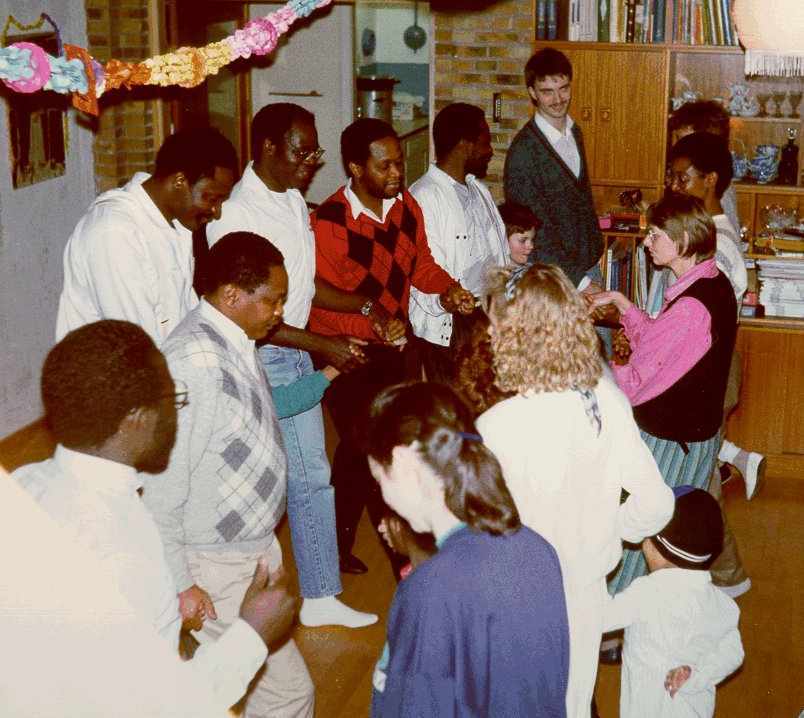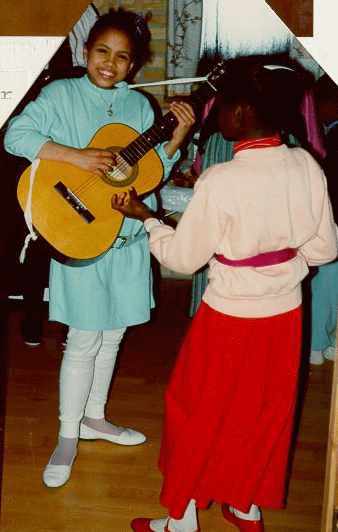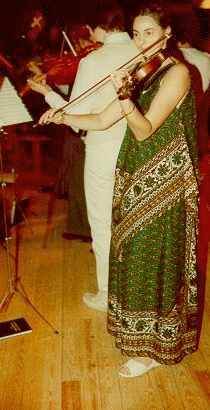


Fætter Mikkel (Cousin Mikkel) |
| Niels Mejlhede Jensen, Bøgeløvsvej 4, 2830 Virum, Denmark. e-mail (web master) |
CONTENTS: (remember: you can use Ctrl Home in usual browsers to get to the top of this page, to the links here)
 |
 |
 |
Photo of this week: Guests from Africa dance the dance of this
week in our home. Some of the colourful musicians.
I always include this dance, Fætter Mikkel, when I am invited to some social event to come and play for half an hour to get people participate in dancing a little folk dance. This dance is reasonable easy to explain to people that don't know anything about folk dancing. And the group feel that they get together in solving a common task, with occasionally individual challenges. Children and adults participate equally enthusiastically. If they have been seated for a couple of hours until then they like this occasion to have their legs moved. When this dance is over as a surprising success, they are all ready for the next dance (which I usually select to be in a big circle with mixing people). After still a dance people without physical training may be exhausted, and it is time to stop for me. And that is all in many cases. At some places there may be another round with 2-5 dances. I did this for nothing but the fun several 100 times during some years. Folk dancers dance 30 dances an evening and feel nothing but more fit afterwards, and for me it is just relaxing to shortly explain the dances before the fun of playing them.
Folk dancing shall be a pleasure, as it historically always has been.
And the dances must not be more complicated than it is a pleasure. The
same dance was in the old time anyway danced a little different in the
neighbouring regions.
Dance of the week, 1999, January 11:
The melody can be heard in midi on computer piano in my tempo (if you
have a sound card). (The melody will loop here until you stop it. In the
table below it will play once). (I have not played the tunes here with
the "drive" I want for dance music).
| 1 | melody | the traditional good dancing melody, polished through generations of use on the fiddle | |
| . | chord
text |
Midi metronome = 100. | simple (folk music) chords, natural for playing the accordion;
these chords are used to make the other parts or voices in triad harmony; there should be no tension from dissonance anywhere including in octavo |
| 2 | A | (Above), parallel part nearest above in third or little more above | |
| 3 | B | (Below), parallel part nearest below in third or little more below | |
| 4 | ns | simple n part (see 8); often with the tonic feeling and often with the basic dance rhythm ("motor part") | |
| 5 | C1 | C parts are made from A and B parts, and so they are two parts to the melody | |
| 6 | C2 | C2 is less simple than C1 | |
| 7 | mod =
contra part |
voice up and down (mostly) contra to the melody; it is also made from A and B | |
| 8 | n1 | less constricted part, and tones from the melody are freely included | |
| 9 | n2 | 9-11: more n parts or C parts above, or parts in octavo | |
| 10 | As | simple A | |
| 11 | Bs | simple B | |
| 12 | blank | . | blank staff for making your own part according to the principles here |
(The midi music is not repeated, except for 1' and 2' voltas).
Use also octavo, up and down.
Where wanted, notes can be changed according to the principles (use
a colour pencil).
The music is aimed at dancing, so part of the orchestra can be the
underlying "motor" when another instrument group is playing its "solo"
part (improvisation) as one of the many repetitions.
The double bass may play its usual notes, because of its low pitch.
It is better to choose a more simple part and play it well.
Parts can be made very simple. I did so with this one (among others),
and with my 4 children (then young) we had a family band of 6, (and got
a local music prize).
Accordion: beats per bar: 2+2
(Help coming back from that note
sheet: CLICK note sheet to come back to this page, or just close note
window.
Remember: the note sheet opens in a new separate window, and that may
cover the whole screen. The back button in the tools bar does probably
not work because the window is new, with no history. All you see on the
page are notes because I have placed no link back here for not disturbing
easy submitting to the printer. Close the note window with a click at the
top or with Alt F4, or minimize or reduce the window, or ..., and you are
back to the main page that was there behind all the time).